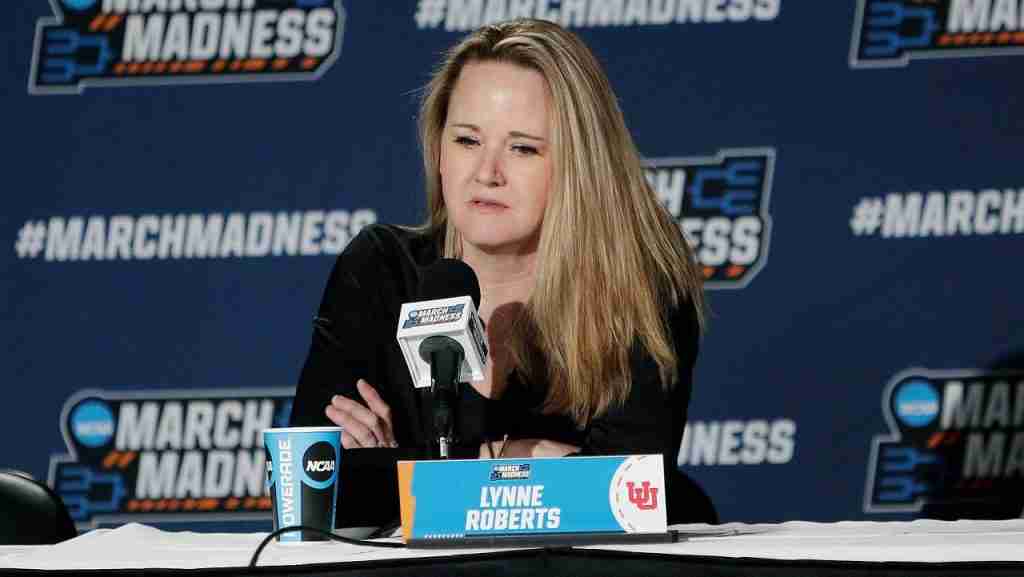Utah coach Lynne Roberts said her team suffered a series of “racial hate crimes” after arriving at its first NCAA women’s tournament hotel and was forced to change accommodations during the event for security reasons.
Roberts revealed what happened after Utah lost to Gonzaga in the second round of the NCAAs Monday evening. Roberts did not go into detail, but said several incidents occurred Thursday evening after the team arrived in the Spokane, Wash., area for the tournament and disrupted the traveling group to the point where there were concerns about safety.
Utah was staying about 30 miles away in Coeur d’Alene, Idaho, and was moved to another hotel Friday.
“We had several instances of racial hate crimes against our program and (it was) incredibly upsetting for all of us,” Roberts said. “In our world, in sports and in academia, this is shocking. There is so much diversity on a college campus and you just aren’t exposed to it very often.
Tony Stewart, an official with the Kootenai County Human Relations Task Force, said Tuesday that two teams were walking from the hotel to a restaurant when a truck flying a Confederate flag arrived. The driver began using racist language, including the N-word.
After the teams left the restaurant, the same driver returned “now reinforced by others,” Stewart said, and they revved their engines and yelled at the players again. Stewart did not identify the second team. In addition to Utah, South Dakota State and UC Irvine remained in Coeur d’Alene.
“We were all in shock and we looked at each other and said: did we just hear that? … Everyone was in shock — our cheerleaders, our students who were in that area and clearly heard it were just frozen,” said Utah assistant athletic director Charmelle Green, who is black, at KSL.com.
Coeur d’Alene Police Chief Lee White said about 100 people were in the area that night, but investigators have yet to interview those involved. He said two charges could be pursued by the state — malicious harassment and disorderly conduct — if someone was arrested. White also said he was working with the FBI.
“Until we have all the facts and the investigation is complete, what charges may be brought against the perpetrators remain to be determined,” White said.
Idaho Governor Brad Little issued a statement which said, in part, “There is no place for racism, hatred or bigotry in the great state of Idaho.” We condemn bullies who seek to harass and silence others.
Utah, South Dakota State and UC Irvine were staying in Idaho hotels, even with Gonzaga as the host school, due to the lack of hotel space in the Spokane area. Several years ago, the city was announced as host of the first and second rounds of the men’s NCAA tournament and a large regional youth volleyball tournament was also held in the area over the weekend.
This left limited hotel space and Gonzaga received a waiver from the NCAA to allow teams to be housed in Coeur d’Alene.
“Racism is real, it exists and it’s horrible. So for our players, whether they were white, black, green, whatever, no one knew how to deal with that and it was really upsetting,” Roberts said. “For our players and staff to not feel safe in an NCAA tournament environment is a waste.”
Roberts said the NCAA and Gonzaga worked to move the team after the first night.
“It was a distraction, upsetting and unfortunate. This should be positive for everyone involved. This should be a joyous time for our program and to have a black eye on the experiment is unfortunate,” Roberts said.
Gonzaga released a statement after Roberts finished speaking, saying the first priority was the safety and well-being of everyone attending the event.
“We are frustrated and deeply saddened to know that what should always be an incredible visitor and championship experience has been compromised in any way by this situation, as it in no way reflects the values, standards and beliefs to which we at Gonzaga University hold ourselves accountable,” the statement said.
Far-right extremists maintained their presence In the region. In 2018, at least nine hate groups operated in the Spokane area and northern Idaho, according to the Southern Poverty Law Center.

